In the realm of unemployment insurance, the intricacies of income reporting can often leave individuals perplexed. Idaho, known for its breathtaking landscapes and vibrant economy, has its own unique set of rules and regulations governing the reporting of income, including tips.
Embark on an enlightening journey as we delve into the nuances of tip reporting in Idaho, exploring the requirements, implications, and exceptions that shape this aspect of unemployment insurance.
Navigating the complexities of unemployment insurance can be daunting, but understanding the guidelines surrounding tip reporting is crucial for ensuring accurate and timely benefits. This comprehensive guide will equip you with the knowledge necessary to navigate the unemployment insurance system in Idaho, ensuring that your tip income is reported correctly and your benefits are maximized.
Income Reporting Requirements for Idaho Unemployment Insurance
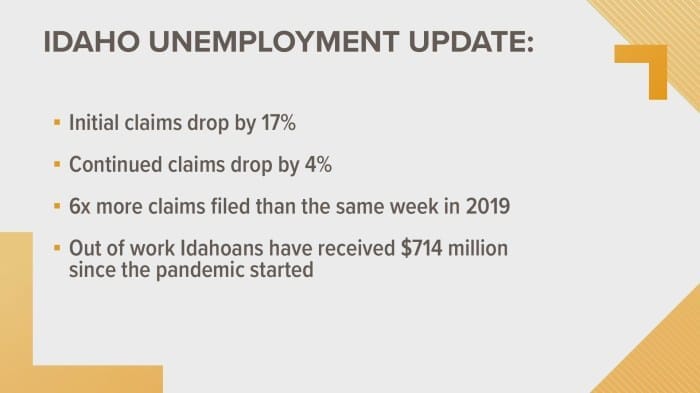
Filing for unemployment insurance in Idaho involves reporting all types of income, whether earned or unearned, that may affect your benefit eligibility and amount. It’s crucial to accurately report your income to avoid any issues or delays in processing your claim.
Earned Income:
- Wages, Salaries, and Commissions: Report all income earned from your employment, including hourly wages, bonuses, and commissions. This includes income from part-time, temporary, or contract work.
- Self-Employment Income: If you are self-employed, report your net income after deducting business expenses. This includes income from freelancing, consulting, or operating a business.
- Severance Pay: Any lump-sum payment received from your employer as a result of termination or layoff should be reported as earned income.
Unearned Income:
- Unemployment Benefits: Any unemployment benefits received from other states or the federal government must be reported.
- Pension and Retirement Income: Report any income received from pensions, annuities, or retirement accounts.
- Social Security Benefits: Social Security benefits, including Social Security Disability Insurance (SSDI) and Supplemental Security Income (SSI), should be reported.
- Investment Income: Report any income from investments, such as dividends, interest, or capital gains.
Definition of Tips as Income
In the context of unemployment insurance in Idaho, tips received by employees are considered income and subject to reporting requirements. Understanding the definition of tips and the distinction between cash tips and non-cash gratuities is essential for accurate reporting and compliance with unemployment insurance regulations.
Cash Tips
Cash tips are monetary gratuities received directly from customers in the course of employment. These tips are typically paid in cash and are not subject to withholding taxes. Examples of cash tips include:
- Money left on a table or counter for service in a restaurant or bar.
- Tips received by taxi drivers, hair stylists, or other service providers.
- Cash tips received by delivery drivers.
Non-Cash Gratuities
Non-cash gratuities are non-monetary items or services received by employees as a form of compensation for their work. These gratuities may include:
- Gift cards or certificates.
- Free or discounted meals or services.
- Merchandise or products provided by the employer.
Non-cash gratuities are also considered income for unemployment insurance purposes and must be reported along with cash tips.
Reporting Tips When Filing for Unemployment Insurance

When filing for unemployment insurance in Idaho, it’s crucial to accurately report tip income. This ensures you receive the full benefits you’re entitled to and helps maintain the integrity of the unemployment insurance system.
Calculating Tip Earnings
Calculating tip earnings accurately is essential for reporting them correctly. Here are some guidelines to follow:
- Keep Detailed Records: Maintain a daily or weekly record of your tip earnings. Note the date, amount of tips received, and the source (e.g., cash, credit card, etc.).
- Review Pay Stubs: If your employer provides pay stubs, check for a separate line item that shows your tip earnings. This can serve as a reliable source of documentation.
- Use Tip Reporting Forms: Some employers may provide tip reporting forms. Fill out these forms accurately and submit them to your employer as required.
Reporting Tip Income
When filing your unemployment insurance claim, you’ll need to report your tip income accurately. Here’s how:
- Include Tips in Gross Earnings: When reporting your gross earnings, include your tip income along with your wages. This information is typically requested on the unemployment insurance application form.
- Specify Tip Income: Some unemployment insurance applications may have a separate section for reporting tip income. If so, be sure to fill it out accurately.
- Provide Documentation: If requested, be prepared to provide documentation supporting your tip income. This may include pay stubs, tip reporting forms, or other records you’ve kept.
Impact of Tips on Unemployment Benefits
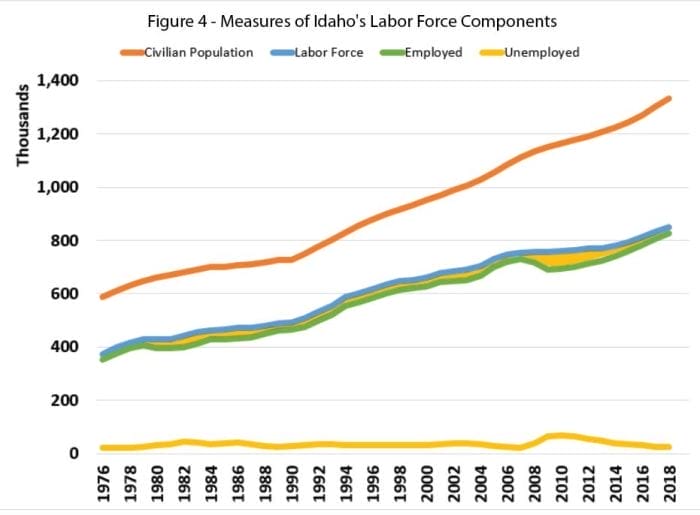
The reporting of tips can significantly influence the unemployment benefits an individual is entitled to receive. It’s crucial to understand how tips are treated and the potential consequences of underreporting or failing to report tip income.
Tips as Income
Tips are considered income and must be reported when filing for unemployment insurance. The amount of unemployment benefits an individual receives is calculated based on their previous earnings, including tips. Therefore, accurately reporting tips ensures that the unemployment benefits accurately reflect the individual’s financial situation.
Underreporting or Failing to Report Tips
Underreporting or failing to report tip income can have serious implications. It may result in lower unemployment benefits, as the benefits are calculated based on the reported income. Additionally, it may lead to ineligibility for unemployment benefits altogether, as misrepresenting income is considered fraud.
Penalties for Misrepresenting Income
Misrepresenting income, including underreporting or failing to report tips, can result in penalties. These penalties may include having to repay the unemployment benefits received, facing fines, or even criminal charges. The severity of the penalties depends on the extent of the misrepresentation and the laws of the specific state.
Reporting Tips Accurately
To avoid any complications, it’s essential to report tips accurately when filing for unemployment insurance. This involves keeping detailed records of all tips received, including the date, amount, and source of the tips. These records can be used to substantiate the reported tip income in case of an audit.
Exceptions and Special Considerations
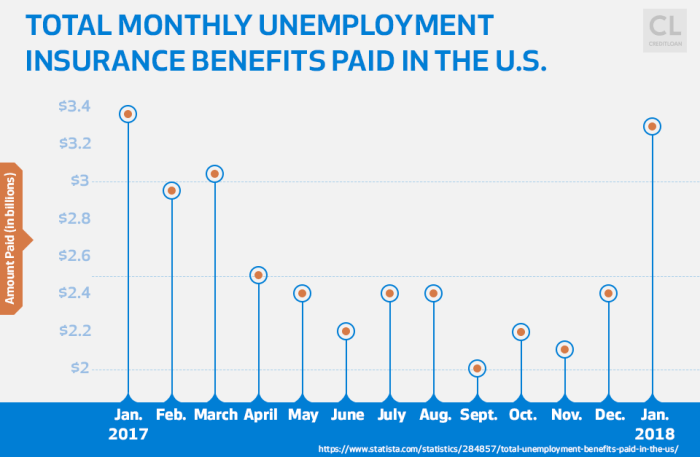
There are certain exceptions and special circumstances where tips may not be considered income for unemployment insurance purposes. These exceptions are designed to address situations where tips are not earned through regular employment or are not considered part of an employee’s regular wages.
Exclusions from Tip Income
The following types of tips are generally excluded from income when determining unemployment benefits:
- Tips received from customers in a non-service industry. This includes tips received by employees in industries such as manufacturing, construction, and retail, where tipping is not customary.
- Tips received by employees who are not customarily tipped. This includes employees in positions such as office workers, janitors, and security guards, who do not typically receive tips as part of their regular wages.
- Tips received as a gift or gratuity. This includes tips that are given to an employee as a token of appreciation or as a reward for exceptional service, rather than as a regular part of their wages.
Reporting Requirements for Excluded Tips
Even though excluded tips are not considered income for unemployment insurance purposes, they must still be reported to the unemployment insurance agency. This is because excluded tips are still considered wages for other purposes, such as Social Security and Medicare taxes.
When reporting excluded tips, it is important to clearly indicate that the tips are being excluded from income. This can be done by using a separate form or by writing “Excluded Tips” next to the amount of tips reported.
Documentation and Record-Keeping
Accurate and up-to-date records of tip income are crucial for unemployment insurance purposes. Whether you’re filing an initial claim or reporting ongoing tip earnings, maintaining detailed records ensures you receive the benefits you’re entitled to.
Tracking and Documenting Tip Earnings
Here are some tips for tracking and documenting your tip earnings:
- Daily Tip Log: Keep a daily log of all tips received. Include the date, amount, and any relevant details (e.g., table number, customer name).
- Electronic Records: If your employer provides electronic records of tips, ensure they are accurate and accessible.
- Credit Card Receipts: Collect credit card receipts that show the tip amount. These receipts serve as written proof of tip income.
- Pay Stubs: Review your pay stubs to ensure that tips are reported correctly.
- Bank Statements: Keep track of deposits from tip income into your bank account.
Methods and Tools for Record-Keeping
Various methods and tools can help you maintain accurate records of your tip income:
- Tip Tracking Apps: Mobile apps specifically designed for tracking tips can make the process easier and more efficient.
- Spreadsheets: Create a spreadsheet to record daily tip amounts, dates, and other relevant information.
- Accounting Software: If you’re self-employed, consider using accounting software to manage your tip income.
- Receipts and Checkbook: Keep receipts and checkbook records as physical proof of tip income.
By following these record-keeping practices, you’ll have the necessary documentation to support your unemployment insurance claim and ensure you receive the benefits you deserve.
Penalties for Misrepresenting Tip Income
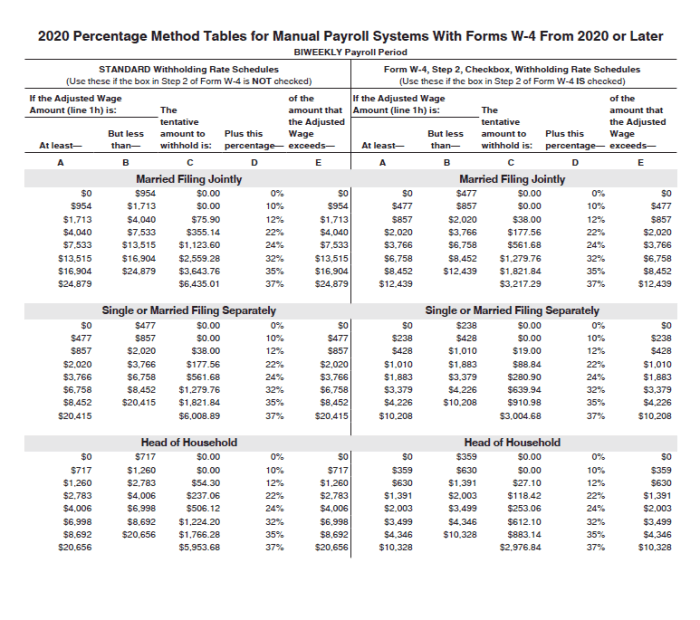
Misrepresenting or failing to report tip income when filing for unemployment insurance can result in serious consequences and legal implications. It is crucial to accurately report all sources of income, including tips, to maintain integrity and avoid potential penalties.
Potential Penalties
- Denial of Benefits: Misrepresenting tip income may lead to denial of unemployment benefits. Unemployment insurance programs are designed to provide temporary financial assistance to eligible individuals who have lost their jobs through no fault of their own. Misrepresenting tip income undermines the integrity of the program and may result in disqualification from receiving benefits.
- Overpayment Recovery: If tip income is not reported and benefits are subsequently paid based on incorrect information, the unemployment agency may require repayment of the overpaid benefits. This can create a financial burden and additional stress for individuals who may already be facing economic hardship.
- Legal Consequences: Misrepresenting tip income when filing for unemployment insurance can be considered fraud. Depending on the severity of the misrepresentation, individuals may face legal consequences, including fines, imprisonment, or both. Unemployment insurance fraud is a serious offense that can have long-term implications, such as difficulty obtaining employment or housing in the future.
Changes in Tip Reporting Requirements
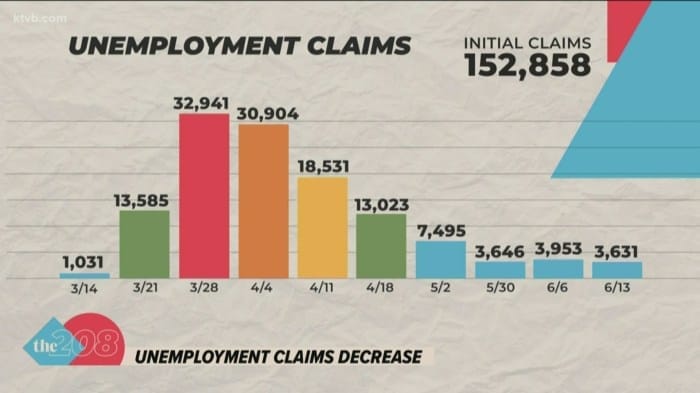
The realm of tip reporting for unemployment insurance in Idaho has witnessed a dynamic evolution in recent times, marked by significant shifts in regulations and proposed amendments that have the potential to reshape the landscape for individuals seeking unemployment benefits.
These alterations have been driven by the overarching goal of ensuring accurate and comprehensive reporting of tip income, thereby safeguarding the integrity of the unemployment insurance system and guaranteeing fair access to benefits for those who genuinely qualify.
Recent Changes
- Mandatory Electronic Reporting: In line with the growing emphasis on digitalization, Idaho has implemented a mandate for electronic reporting of tip income. This move streamlines the reporting process, reduces administrative burdens, and enhances the accuracy and timeliness of data submission.
- Expanded Tip Pooling: Recognizing the prevalence of tip pooling arrangements in various industries, Idaho has expanded the scope of permissible tip pooling practices. This change acknowledges the complexities of modern workplace dynamics and aims to ensure equitable distribution of tips among eligible employees.
- Increased Employer Responsibilities: Employers are now required to provide employees with clear and accessible information regarding tip reporting obligations. This includes disseminating educational materials, conducting training sessions, and establishing internal mechanisms to facilitate accurate and timely reporting.
Proposed Changes
- Tip Allocation Methodology: A proposal under consideration seeks to modify the methodology for allocating tips among employees in tip pooling arrangements. The proposed changes aim to establish a more standardized and equitable approach to tip distribution, addressing concerns about potential disparities in earnings.
- Enhanced Record-Keeping Requirements: Another proposed amendment focuses on strengthening record-keeping requirements for employers and employees. The goal is to ensure meticulous documentation of tip income, enabling more effective audits and investigations in cases of suspected misreporting.
Potential Impact on Individuals
The aforementioned changes and proposed amendments have the potential to impact individuals filing for unemployment benefits in several ways:
- Increased Accuracy and Timeliness: Electronic reporting and enhanced record-keeping requirements may lead to more accurate and timely reporting of tip income, potentially reducing delays in processing unemployment insurance claims.
- Fairer Benefit Calculations: The proposed changes to tip allocation methodology and record-keeping requirements could result in fairer calculations of unemployment benefits, ensuring that individuals receive benefits commensurate with their actual earnings.
- Increased Compliance: The mandatory electronic reporting requirement and expanded employer responsibilities may lead to increased compliance with tip reporting regulations, minimizing the risk of misrepresentation and ensuring the integrity of the unemployment insurance system.
Comparison with Other States
Idaho’s tip reporting requirements for unemployment insurance are generally similar to those of neighboring states and other states with similar economic conditions. However, there are some notable differences in the treatment of tip income.
Reporting Thresholds
One of the key differences is the reporting threshold for tips. In Idaho, employees are required to report all tips received in a month if they exceed $20. This threshold is higher than in some other states, such as Oregon, where employees must report all tips received in a month if they exceed $12.
Taxation of Tips
Another difference is the way that tips are taxed. In Idaho, tips are subject to both federal and state income taxes. However, some other states, such as Nevada, do not tax tips at the state level.
Impact on Unemployment Benefits
The treatment of tips can also impact the amount of unemployment benefits that an individual receives. In Idaho, tips are counted as wages for the purpose of calculating unemployment benefits. This means that individuals who receive tips may have higher unemployment benefits than those who do not.
Conclusion
Overall, Idaho’s tip reporting requirements for unemployment insurance are similar to those of neighboring states and other states with similar economic conditions. However, there are some notable differences in the treatment of tip income, such as the reporting threshold, taxation of tips, and impact on unemployment benefits.
Resources and Support
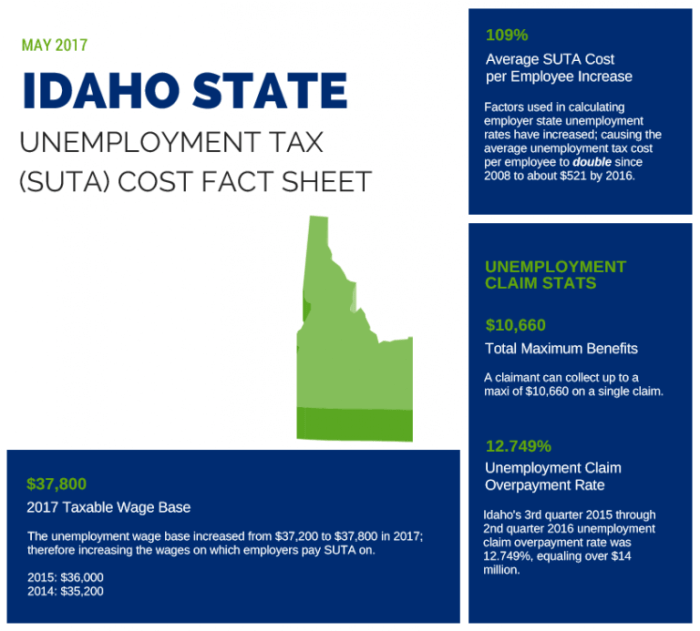
Navigating the intricacies of reporting tip income for unemployment insurance in Idaho can be daunting. Fortunately, there are various resources and support services available to individuals seeking information, guidance, or assistance.
These resources range from government agencies to legal aid organizations and online platforms, each offering valuable information and support tailored to specific needs.
Government Agencies
The Idaho Department of Labor is the primary government agency responsible for administering unemployment insurance benefits in the state. Individuals can access a wealth of information on the department’s website, including detailed guidelines on reporting tip income, eligibility criteria, and benefit calculation methods.
The department also provides dedicated phone lines and email addresses for inquiries and assistance. Additionally, individuals can schedule in-person appointments at local unemployment insurance offices for personalized guidance and support.
Legal Aid Organizations
Several legal aid organizations in Idaho offer free or low-cost legal assistance to individuals facing challenges related to unemployment insurance benefits. These organizations provide comprehensive support, including legal advice, representation in appeals and hearings, and assistance in resolving disputes with the Idaho Department of Labor.
To find a legal aid organization near you, visit the Idaho Legal Aid Services website or contact your local bar association.
Online Resources
Numerous online resources provide valuable information and guidance on reporting tip income for unemployment insurance in Idaho. These resources include:
- Idaho Department of Labor website: The department’s website offers comprehensive information on unemployment insurance benefits, including detailed instructions on reporting tip income.
- Idaho Legal Aid Services website: This website provides information on legal aid organizations in Idaho, including contact information and areas of expertise.
- Idaho State Bar Association website: The association’s website offers a directory of legal aid organizations in the state, as well as information on pro bono legal services.
- U.S. Department of Labor website: The federal government’s website provides general information on unemployment insurance benefits, including links to state-specific resources.
Closure
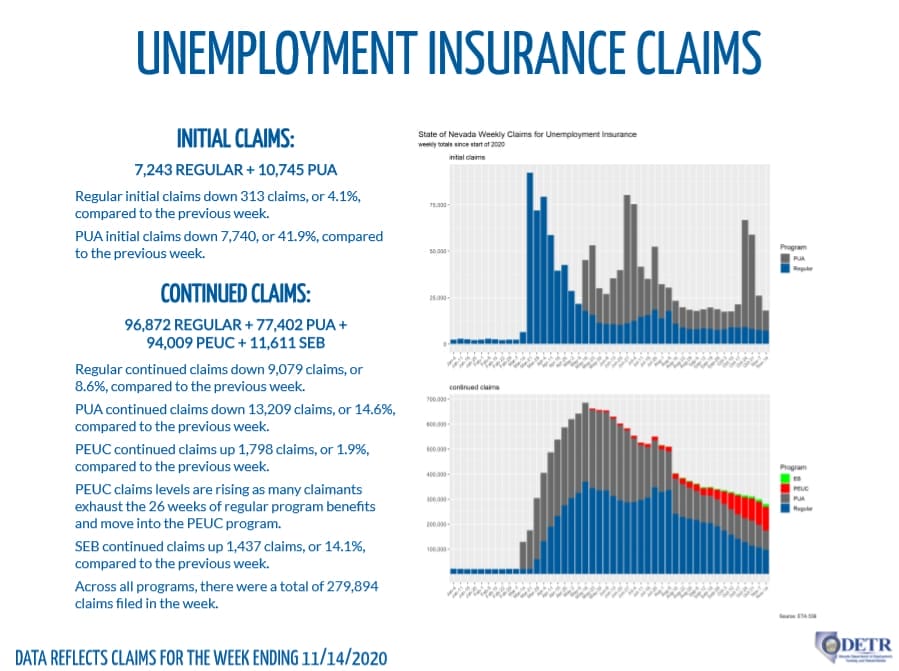
As we conclude our exploration of tip reporting for Idaho unemployment insurance, it is evident that the intricacies of income reporting require careful attention to detail. By adhering to the guidelines Artikeld in this comprehensive guide, individuals can ensure that their tip income is accurately reported, maximizing their unemployment benefits and avoiding potential penalties.
Whether you’re a seasoned worker or navigating the unemployment system for the first time, understanding these regulations is essential for a smooth and successful experience.
Answers to Common Questions
Q: Are tips considered income for unemployment insurance purposes in Idaho?
A: Yes, tips received by employees in Idaho are considered income for unemployment insurance purposes. Both cash tips and non-cash gratuities must be reported as part of your total income when filing for unemployment benefits.
Q: How do I report tip income when filing for unemployment insurance in Idaho?
A: To report tip income when filing for unemployment insurance in Idaho, you must accurately calculate and document your tip earnings. This can be done through various methods, such as keeping a daily tip log or using a tip reporting app.
You must then report this income on your unemployment insurance claim form.
Q: How do tips affect the amount of unemployment benefits I receive?
A: Reporting tips may impact the amount of unemployment benefits you receive. In Idaho, your tip income is added to your other earned income to determine your weekly benefit amount. The more tip income you report, the higher your weekly benefit amount may be.
Q: Are there any exceptions to the rule that tips are considered income for unemployment insurance purposes?
A: Yes, there are a few exceptions to the rule that tips are considered income for unemployment insurance purposes. For example, tips received by employees who work in food and beverage establishments and who earn less than $20 in tips per month are not considered income for unemployment insurance purposes.
Q: What are the penalties for misrepresenting or failing to report tip income when filing for unemployment insurance?
A: Misrepresenting or failing to report tip income when filing for unemployment insurance can result in severe penalties. These penalties may include being required to repay unemployment benefits you received, as well as fines and potential criminal charges.



